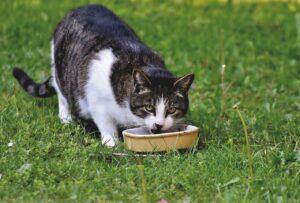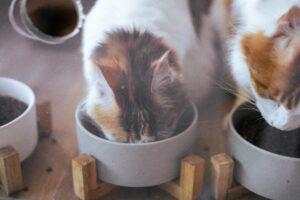Wondering can cats eat canned chicken because sometimes you run out of time to prepare raw meat? We will guide you through this!
It’s entirely natural for you to desire to indulge your feline companion with good food occasionally. Cats can consume a variety of edibles, including tinned poultry, which is one alternative among numerous.
Tinned poultry is a favored choice for guardians who wish to provide their cats with a dietary variation or a unique delight because of its adaptability and ease of transport.
Although tinned poultry may appear to be a nutritious choice for your furry friend, carefully considering its advantages and disadvantages before offering it to them is crucial.
In this article, we’ll answer, “can cats eat canned chicken?” from every angle, including the food’s nutritional worth, its health benefits, and any potential dangers it may pose to our feline friends.
Table of Contents
Recognizing varieties of canned chicken
Before answering, can cats eat canned chicken? Take a look at its various types.
The canned chicken comes in a variety of types, making it an accessible and adaptable meal choice for both humans and felines.
In order to retain its freshness and increase its shelf life, chicken is often canned after being cooked, processed, and sealed.
Canned chicken is available in a number of varieties to meet the nutritional and aesthetic demands of a wide range of consumers.
Canned chicken is an excellent choice since it’s high protein content helps cats’ muscles, tissues, and energy levels.
Some items come pre-hydrated with water, so you may drink that as well. Canned chicken may be a healthy addition to a pet’s diet, but owners should be careful not to make it the sole source of nutrition.

Nutritional value Of canned chicken
Moderate consumption of canned chicken has several health benefits for cats. The primary ingredient, chicken, is a high-quality protein source that is essential for a cat’s well-being.
Cats rely on proteins to keep their muscles healthy, repair damaged tissues, and boost their stamina and vitality.
Chicken is a complete and balanced protein source since it contains all the important amino acids cats need but cannot produce themselves.
Canned chicken benefits a cat’s diet because of its high protein level, which aids in many bodily processes.
Canned chicken can be a nice treat for cats, but it shouldn’t substitute a commercial cat food with all the nutrients your cat needs regularly.
Check out this comprehensive canned chicken nutrition facts table:
| Nutrient | Percentage |
|---|---|
| Crude Protein | 36-61% |
| Crude Fat | 10-15% |
| Moisture | 65-75% |
| Fiber | 0-3% |
| Ash | 2-5% |
| Calcium | 0.8-1.5% |
| Phosphorus | 0.8-1.2% |
| Magnesium | 0.06-0.1% |
| Sodium | 0.1-0.3% |
| Potassium | 0.2-0.5% |
| Chloride | 0.2-0.4% |
| Taurine | 0.1-0.2% |
| Vitamin A | 1,000-10,000 IU/kg |
| Vitamin D3 | 200-400 IU/kg |
| Vitamin E | 15-30 IU/kg |
| Thiamine | 0.05-0.1 mg/kg |
| Riboflavin | 0.1-0.2 mg/kg |
| Niacin | 3-6 mg/kg |
| Vitamin B6 | 0.05-0.1 mg/kg |
| Folate | 0.05-0.1 mg/kg |
| Vitamin B12 | 0.02-0.03 mcg/kg |
| Biotin | 0.03-0.05 mcg/kg |
| Pantothenic Acid | 1-2 mg/kg |
Pros of feeding chicken to cats
Can cats eat canned chicken, and is it healthy? When added to a cat’s diet in moderation, canned chicken can improve its health in several ways.
This delectable and easy-to-prepare snack may supplement their usual diet, boosting their health and vitality. Canned chicken has several significant health advantages for cats:
Excellent resource for Protein
Cats, being obligate carnivores, need a high-protein diet primarily from animal sources. High-quality protein, such as that found in canned chicken, is essential for many body processes.
Protein is necessary to grow and repair muscles and tissues and maintain a healthy immune system. Feeding your cat canned chicken gives it access to a protein source that is both high in nutrients and protein, improving its general health.
Helps keep the Weight off
Obesity is dangerous for cats and can cause many health problems, so it’s essential to keep them at a healthy weight.
The high protein content of canned chicken aids in weight management because it keeps cats fuller for longer.
Overweight or inactive cats can benefit from proper portion control and the addition of canned chicken as a treat to help them maintain a healthy weight.

Promotes hydration
Canned chicken items packaged in water offer extra moisture for feline friends. Cats have a low thirst drive, making it difficult for them to drink enough water to meet their hydration needs. As a result of increased fluid consumption, urinary tract, and kidney diseases are less likely to develop.
Stimulates hunger
Cats who are stressed, sick, or changing diets might become picky eaters. Canned chicken is an excellent option for getting your cat to eat because of its delicious smell and taste. It’s beneficial for cats whose appetite has been negatively impacted by sickness or medication.
Perfect for senior cats
Dry kibble might be difficult for senior cats to eat because of dental problems. The soft texture of canned chicken might be simpler to chew for senior cats, ensuring they get the nourishment they need without any pain.
Source of essential nutrients
In addition to being a good source of protein, canned chicken is also a good source of other nutrients, including vitamin B6, niacin, and minerals like selenium and phosphorus.
Cats need these nutrients for proper energy metabolism, immune system maintenance, and bone development, among other physiological activities.
Promotes healthy skin and coat
Canned chicken’s high protein content benefits your cat’s skin and coat. Chicken’s abundance of vital amino acids helps prevent skin disorders and excessive shedding by keeping the skin and hair healthy.
Can cats eat canned chicken breast?
Canned chicken breast is okay for cats to consume.
Protein is crucial to a cat’s health, and canned chicken breast is an excellent supply. Cats need protein for sustained energy, muscular health, and tissue regeneration.
To avoid nutritional deficits, canned chicken breast should be offered in moderation and as part of a well-rounded diet.
If you have a cat, it is essential to read the label carefully and avoid any products that include gravy or bones.
Stop using it and talk to your vet if you notice any negative responses, such as allergies or stomach upset.

Can cats eat canned white chicken?
Canned white chicken is safe for cats to consume.
Protein is abundant in canned white chicken, which is vital to a cat’s health. It’s high in the amino acids that cats need to build and keep their muscular mass and carry out their daily activities. However, serve it in moderation and not as the main course.
It’s essential to check the canned white chicken for any extra salt or preservatives that might be hazardous to your cat.
If your cat has food allergies or a medical condition, consult your vet before introducing any new foods to their diet.
Can cats eat canned chicken in water?
Canned chicken in water is safe for cats to consume. Feline diets can benefit from the protein and water included in canned chicken in water.
Those cats that don’t drink enough from their bowl can nevertheless stay hydrated thanks to the high water content.
This pre-packaged alternative has none of the unhealthy fats or salt that are commonly present in gravy substitutes.
Canned chicken is good as a treat or supplement, but cats should get all the protein and other elements they need from their daily meal.
Before feeding your cat canned chicken in water, you should see whether it has any allergies or sensitivities.
Health concerns
Every conscientious cat owner asking can cats eat canned chicken should know that there are some serious health issues associated with feeding it.
While there are advantages to feeding your cat canned chicken, you must be careful and make well-informed choices to ensure your cat’s health.
Sensitivities and allergies
Chicken is one meal that cats, like people, can become allergic to or sensitive to. Symptoms of an allergic response range from mild irritation to full-blown asthma attacks.
When feeding canned chicken to your cat, observing their reaction is essential. Stop using it immediately if side effects appear, and see a vet about what’s causing the response and what other foods could work.
Quantity of sodium
Several canned chicken brands use salt or preservatives to improve taste and extend shelf life. Cats, like humans, can have health concerns from consuming too much salt.
Your cat’s circulatory system may feel the effects of high salt levels in the form of hypertension.
It can also affect renal function, leading to various kidney-related problems. Choose low-sodium canned or unsalted raw chicken to reduce exposure to this risk factor.
Bones and gravy
Your cat’s health might be at risk if you feed it canned chicken from a particular brand since it contains microscopic bone pieces.
Avoid giving your cat any cooked bones since they might shatter and cause internal injury. Some varieties of canned chicken come with gravy, which can add more fat and flavor to the dish.
Regular consumption of these chemicals can cause weight gain and digestion issues. Choose boneless canned chicken and steer clear of goods with gravy unless they are specifically for felines.

Inadequate nutrition
Canned chicken is a fantastic source of protein, but you shouldn’t use it in place of a complete and balanced cat food diet.
Canned chicken may not be sufficient as a single source of nutrition for cats since it lacks some of the critical elements they need, such as taurine, vitamin A, and arachidonic acid.
If you only feed your cat canned chicken, it might lead to nutritional shortages and imbalances that would negatively affect its health.
You can occasionally add canned chicken treats to your cat’s diet, but they should primarily eat commercial cat food designed to satisfy their nutritional needs.
Conclusion
Can cats eat canned chicken? Canned chicken is great for cats to eat on occasion or as an addition to their usual diet.
Canned chicken is a popular option since it delivers both protein and moisture to cats. Commercial cat food satisfies the unique nutritional requirements of cats. One must not substitute this for canned chicken.
Always look for low-sodium canned chicken and know your cat’s allergies. Ask your vet if you’re unsure whether canned chicken suits your cat’s health. You can guarantee your cat has a long and healthy life by feeding it a balanced and varied diet.
FAQs
1. Is canned chicken good for cats?
Cats benefit from moderately fed canned chicken as part of a balanced diet. It’s high in protein, which cats need.
Cats are obligate carnivores and need animal-based protein to eat. Canned chicken supplies amino acids for muscle maintenance and general health. However, it should differ from their commercial cat food tailored to their diet.
2. Can cats eat canned chicken and other foods?
Cats consume canned food, which pet owners like for its ease and taste. Cats like canned food’s variety of flavors and textures.
Canned cat food also provides a balanced diet to ensure kitties get all the necessary nutrients. As with any meal, introduce new canned food gently to minimize digestive issues, especially when switching from dry to wet.
3. Can I feed my cat canned chicken every day?
Giving your cat only canned chicken daily is not a good idea. Canned chicken is an excellent source of protein, but it doesn’t include taurine, vitamin A, or arachidonic acid in commercial cat food.
Eating nothing but canned chicken might throw your body out of whack nutritionally. Canned chicken is good as a special treat or dietary supplement, but it shouldn’t replace your cat’s usual meal.
4. Should I rinse canned chicken before feeding it to my cat?
It’s not always essential to rinse canned chicken before giving it to your cat. Some healthy elements in canned chicken may be lost during the washing process.
To reduce the risk of health problems associated with excessive sodium intake, drain the extra liquid or go for low-sodium alternatives if the canned chicken contains gravy or sauces with added salt or preservatives.
5. What can I feed my cat when I run out of cat food?
When you run out, you may use cooked chicken, turkey, or rice for cat food. Avoid feeding them cat-toxic onions, garlic, and chocolate. Maintain balanced nutrition by restocking cat food immediately.




























